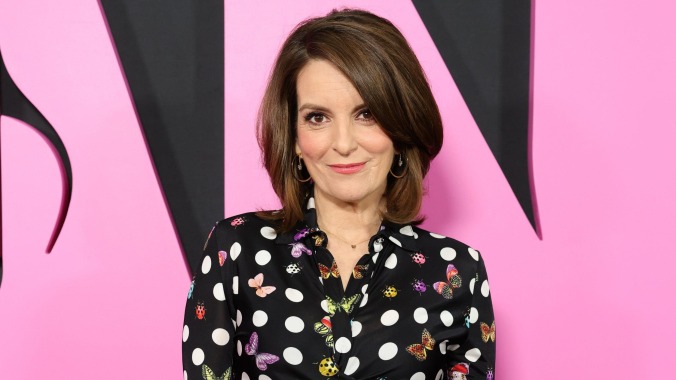Tina Fey casually defines an era of celebrity culture on Bowen Yang’s podcast
Imparting some invaluable career advice on Las Culturistas, Tina Fey tells Bowen Yang, "Authenticity is dangerous and expensive"

There’s a certain clip going around the Internet from Tina Fey’s recent appearance on Las Culturistas, the beloved podcast hosted by comedians Matt Rogers and Bowen Yang. The long-running show is a platform for Rogers and Yang to observe, criticize, and comment on the pop culture landscape. A recurring segment on the show is “I Don’t Think So, Honey,” which is a 60-second chance to air grievances of all kinds (from “cocaine” to “Rolling Stone snubbing Celine Dion on its best singers list”). When Fey—who is an astute cultural critic herself—got her chance at the mic, she used the moment to impart some wisdom from one Saturday Night Live alum to a current cast member.
“I don’t think so honey, Bowen Yang giving his real opinions about movies on this podcast. I regret to inform you that you are too famous now, sir,” she proclaimed, as the hosts laughed in agreement. “What’s gonna happen? You have a problem with Saltburn? Shhh! Quiet luxury. Keep it to yourself, because what are you gonna do when Emerald Fennell calls you about her next project where you play Carey Mulligan’s coworker in the bridal section of Harrods, and then act three takes a sexually violent turn and you have to pretend to be surprised by that turn?”
Fey pointed out that Yang hangs out with his Wicked co-stars “Ariana [Grande] and SpongeBob now” and predicted Rogers has “about one year left” before he’s in the same predicament. “Yes, learn from my mistakes. Learn from Ayo, podcasts are forever,” Fey added, referencing an SNL kerfuffle from the week prior. (A resurfaced clip of Ayo Edebiri criticizing Jennifer Lopez forced the host to make a joke at her own expense because J.Lo was the musical guest.) Fey concluded with a beautifully succinct phrase that sums up not only her argument but an entire era of celebrity culture: “Authenticity is dangerous and expensive. I don’t think so, honey!”
As depressing as the sentiment may be, Fey is right: for an up-and-coming star in Hollywood, true authenticity is a risk. Though Yang cultivated his platform by sharing his genuine thoughts and feelings about pop culture on the podcast, he’s on the cusp of a new level of celebrity where people are paying much closer attention. In recent weeks, he’s made headlines for perceived reactions to Dave Chappelle and Nikki Haley on SNL; in the latter case, he quickly deleted the Haley-critical post on his Instagram after it gained traction (including from this website).
In a certain sense, Fey’s advice is classic mentor-mentee stuff. Be careful what you say and who you say it to in a professional setting, because you don’t know how it might affect you later. But in the realm of celebrity, it’s increasingly sanding down the interesting edges of Hollywood. Artists who used to cultivate their personas with unique perspectives now seem desperate to avoid saying anything of substance. Your mileage on “cancel culture” may vary, but we can see in the way celebrities discuss the subject that the fear of being canceled for saying the wrong thing is very real, and it affects the way they behave, at least publicly.
Interestingly, Fey seems established enough that she doesn’t need to follow her own advice, including a playful joke about Emerald Fennell in her warning to Bowen Yang to be polite to Emerald Fennell. While his burgeoning fame presumably can’t afford any measure of scandal, Fey’s comfortable status in the entertainment industry can withstand it. It can be assumed, then, that a certain amount of time, effort, and success earns an entertainer a degree of authenticity. Still, in this day and age, opacity pays off at every level (the biggest celebrity in the world is a pop star who has largely kept her thoughts and beliefs private for most of her career). While putting a barrier between oneself and the public may protect a celebrity’s best interests, it’s a loss for the rest of us, who see fewer and fewer authentically outspoken artists reflecting the good, bad, and ugly of life back to us.